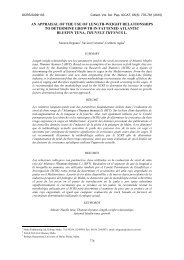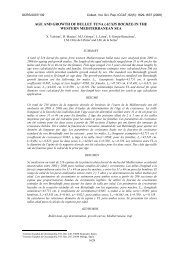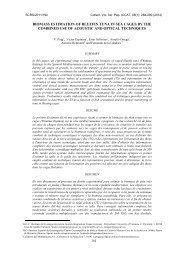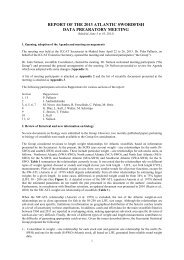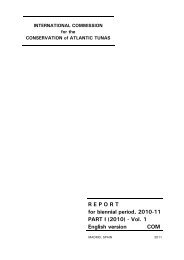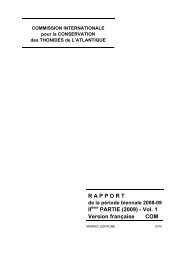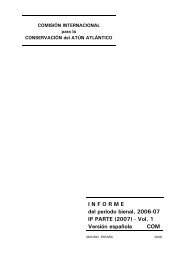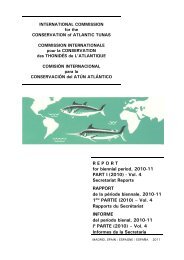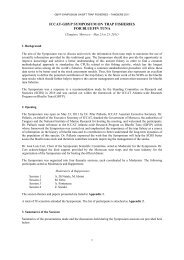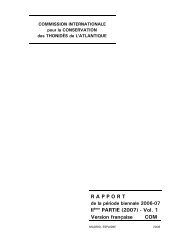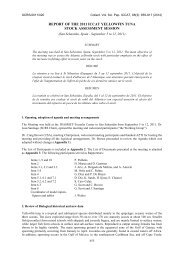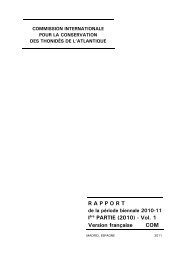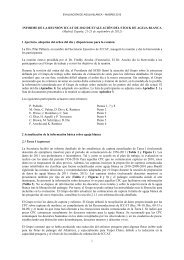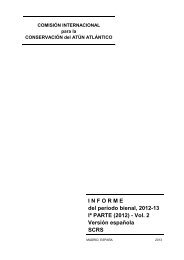E - Iccat
E - Iccat
E - Iccat
You also want an ePaper? Increase the reach of your titles
YUMPU automatically turns print PDFs into web optimized ePapers that Google loves.
ICCAT REPORT 2002-2003 (II)<br />
THE INTERNATIONAL COMMISSION FOR THE CONSERVATION OF<br />
ATLANTIC TUNAS (ICCAT) RESOLVES THAT:<br />
1. An ad hoc joint Workshop of ICCAT scientists and managers be convened in 2003, perhaps in conjunction<br />
with another inter-sessional meeting, with the view to improving collection and provision of data related to<br />
fishing, including farming, of the species covered by the Commission by Contracting Parties and Cooperating<br />
non-Contracting Parties, Entities or Fishing Entities and other non-Contracting Parties.<br />
2. The Workshop should:<br />
a) review data deficiencies for each species under the purview of ICCAT,<br />
b) consider the credibility of catch data and the utility of using trade data collected under the Statistical<br />
Document Programs; and<br />
c) develop recommendations to improve collection and reporting of catch data adequate to conduct or<br />
improve the work of SCRS, PWG, and the Compliance Committee.<br />
3. All Contracting Parties and Cooperating non-Contracting Parties, Entities or Fishing Entities and the<br />
Commission Chairman, SCRS Chairman, Compliance Committee Chairman, SCRS Species Group<br />
Rapporteurs, and Chair of the Sub-Committee on Statistics should be invited to participate. Contracting<br />
Parties and Cooperating non-Contracting Parties, Entities or Fishing Entities are encouraged to include<br />
scientists and managers on their delegations.<br />
4. The ICCAT Secretariat should provide technical and administrative support for the Workshop.<br />
Bluefin Tuna<br />
126<br />
Summary of Species-by-Species Recommendations for Improving Statistics<br />
Appendix 4 to ANNEX 4.3<br />
– Fishing parties should report reliable data on catch, effort, and size in the format requested, and on as fine<br />
a scale as possible. These obligations are considered a minimum standard.<br />
– Uncertainty about catches has become greater due to (1) a probable increase in the level of unreported<br />
catches following the imposition of quotas, and (2) the development of bluefin tuna farming. Efforts<br />
should be made to improve knowledge of farming operations.<br />
– The substitutions of size data used for the calculation of the catch at size need to be revised for the years<br />
prior to 1998. The quality of the size data (sample size) submitted should also be verified.<br />
Billfishes<br />
–When possible, on-board observer programs should be enhanced to define the species composition of<br />
billfish by-catch from longline and purse seine fisheries by considering the distribution and abundance of<br />
billfish in the design of these programs, or alternatively, statistically robust procedures that improve<br />
estimations of catch for all billfish species be developed and applied. It is recommended that the analytical<br />
procedures used to estimate catch by species always be documented, so that uncertainty in the estimates of<br />
catch can be better quantified.<br />
–Sampling/reporting procedures for separating billfish species for those fisheries that continue to report<br />
unclassified billfish should be developed.<br />
–Knowledge about the landings of billfish from countries that have traditionally not reported billfish should<br />
continue to be improved, but from where substantial catches are likely to be occurring by making contacts<br />
with the scientists/administrators of those countries, especially those in West Africa.<br />
Tropical Tunas<br />
Bigeye<br />
–Conduct port sampling on Ghanaian fisheries (purse seiners and baitboats) in order to provide better catch<br />
by species and size data. Verify historical species composition.<br />
–Size data are still missing from many fisheries. All countries catching this species should conduct pertinent<br />
level of size sampling and provide to the ICCAT.



